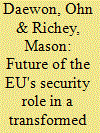| Srl | Item |
| 1 |
ID:
112751


|
|
|
|
|
| Publication |
2012.
|
| Summary/Abstract |
A fundamentally new security landscape is unfolding in East Asia due to the
changing power structure among the great powers, particularly owing to the fast
rise of China and the relative decline of the United States. This paper analyzes the
dynamics of power transition in East Asia and assesses the possibility of the EU
playing a meaningful role in the strengthening of security governance in the
region. It begins by arguing that although the East Asian region is entering a
transformation stage it will not likely lead to a major collision between the United
States and China. This means the EU will have opportunities to become involved
in East Asian security affairs, provided it further strengthens its multi-faceted,
comprehensive engagement policies vis-à-vis the region. We focus particularly
on the EU's ability to promote the positive aspects of East Asian regionalism via
deepened and expanded cooperative measures such as bilateral and multilateral
framework agreements with regional countries and organizations. In addition to
offering a reliable model for regional security governance, the EU will be able to
contribute to regional security by cooperating with the United States and other
East Asian countries and organizations in selected security issues, such as sea-lane
protection, counter-terrorism, non-proliferation of Weapons of Mass Destruction
(WMD), humanitarian operations, etc. Internally, we show that after the Treaty of
Lisbon the EU is approaching incrementally a position wherein it can make
greater CFSP/CSDP engagements-particularly those associated with peacekeeping/
peacemaking and humanitarian operations-in the wider world including East
Asia.
|
|
|
|
|
|
|
|
|
|
|
|
|
|
|
|
| 2 |
ID:
150579


|
|
|
|
|
| Summary/Abstract |
ASIAN MEGACITIES HAVE INFAMOUSLY HIGH AIR POLLUTION, USUALLY THE RESULT
of privileging economic growth over the environment. It is thus noteworthy
when conurbations in Asia address both. The city of Seoul, Korea is a laudable
example
|
|
|
|
|
|
|
|
|
|
|
|
|
|
|
|